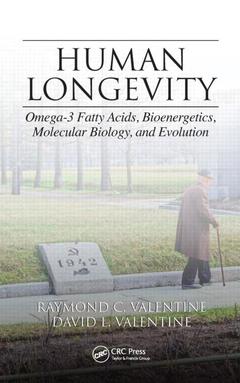Description
Human Longevity
Omega-3 Fatty Acids, Bioenergetics, Molecular Biology, and Evolution
Authors: Valentine Raymond C., Valentine David L.
Language: English
Subjects for Human Longevity:
Keywords
Mitochondrial Membranes; Vice Versa; Darwinian selection of membranes enabling longevity; HUFAs; Mitochondrial bioenergetics and aging; Membrane Peroxidation; Membranes as major targets of oxidative damage; Membrane Fatty Acids; Long-term protection of membranes linked to human longevity; Fatty Acid; Mitochondria and perhaps axons have built-in oxygen avoidance protecting their polyunsaturated membranes; Energy Stress; Aging; Rhodopsin Membrane Disk; Longevity; Age Dependent Diseases; Membrane peroxidation hypothesis; Can; Mitochondrial hypothesis of aging; FOXO; Mitochondrial diseases and aging; Fatty Acids; Life Span; Mitochondrial membrane hypothesis of aging; DHA Principle; Oxidative stress; Naked Mole Rats; Longevity genes; Fatty Acid Peroxides; Longevity animals; Mouse; Longevity insects; DHA; mtDNA; Rhodopsin Disks; ATP Synthase; UCPs; Mitochondrial Ssion; Mitochondrial Fusion; mtDNA Mutations
Approximative price 214.69 €
In Print (Delivery period: 15 days).
Add to cart· 15.6x23.4 cm · Hardback
Description
/li>Contents
/li>Biography
/li>
More than 7 billion people inhabit the earth and all of them are subject to aging. This book is aimed at persons interested in a molecular explanation of how our cells age. Human Longevity: Omega-3 Fatty Acids, Bioenergetics, Molecular Biology, and Evolution is built on the proposition that we age as our mitochondria age. It suggests a revised version of Harman?s famous hypothesis featuring mitochondrial oxidative and energy stresses as the root causes of aging.
Human cells are protected from the ravages of aging by a battery of defensive systems including some novel mechanisms against membrane oxidation introduced in this book. This concept is consistent with recent discoveries showing that mitochondria-targeted antioxidants prevent Huntington?s disease, Parkinson?s disease, and traumatic brain disease in animal models of neurodegeneration.
This book explores a unified theory of aging based on bioenergetics. It covers a variety of topics including an introduction to the science of human aging, the Darwinian selection of membranes enabling longevity, a revised mitochondrial membrane hypothesis of aging, and various mechanisms that protect human mitochondrial membranes, thereby enabling longevity.
Introduction to the Science of Human Aging. Darwinian Selection of Membranes Enabling Longevity. Revised Mitochondrial Membrane Hypothesis of Aging. Many Mechanisms Have Evolved to Protect Human Mitochondrial Membranes, Enabling Longevity.
Raymond C. Valentine is currently professor emeritus at the University of California, Davis and visiting scholar in the Marine Science Institute at the University of California, Santa Barbara. He was also the scientific founder of Calgene, Inc. (Davis, California), now a campus of Monsanto, Inc. The author’s scientific interests involve the use of reductionism to address problems of fundamental scientific and societal importance, such as agricultural productivity and aging. Some of his scientific accomplishments include the discovery of ferredoxin, the identification and naming of the nitrogen fixation (nif) genes, and the development of Roundup® resistance in crops. He holds BS and PhD degrees from the University of Illinois at Urbana-Champaign.
David L. Valentine is currently a professor of earth science with affiliations in ecology, evolution, and marine biology, as well as the Marine Science Institute, at the University of California, Santa Barbara. The author’s scientific interests involve the use of a systems-based approach to investigate the interaction between microbes and the earth, particularly in the subsurface and oceanic realms. He is best known for his research on the biogeochemistry of methane and other hydrocarbons, his works on archaeal metabolism and ecology, and his scientific work on the Deepwater Horizon oil spill. DLV holds BS and MS degrees from the University of California at San Diego and MS and PhD degrees from the University of California at Irvine.




